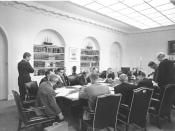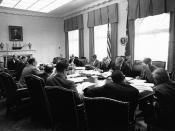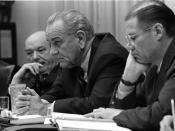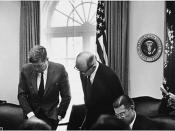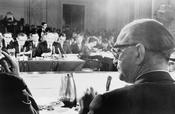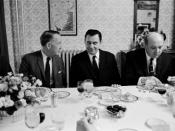Dean Rusk was the second longest serving Secretary of State and served under John F. Kennedy and Lyndon B. JohnsonÃÂs administrations during the years 1961 to 1969. Well known for being the spokesperson of the infamous ÃÂdomino theoryÃÂ, he backed AmericaÃÂs involvement in the Vietnam War even at times when American anti-war sentiment was at an all-time high. Rusk was a prominent character in the decisions that involved deploying ÃÂmilitary advisorsÃÂ and allotting funds to the Vietnam War, rarely admitting that the United States was losing the ill-fought war. Publicly anti-communist and notoriously war hawkish, he believed that military intervention was the only solution available to combat Communism.
John F. Kennedy had chosen Dean Rusk to be his Secretary of State because he had a knack for dealing with foreign affairs along with ability to argue his stance if he was put on the spot. This skill had played out well during the Cuban missile crisis as well as the everlasting conflict known as the Vietnam War.
If it had not been for Rusk, Kennedy would not have been able to win over Congress as well as the approval of the American people to deploy troops for the fight against the spread of communism.
During the years of the Kennedy administration, Rusk had served as assistant secretary for Far Eastern affairs in the Truman administration. At the Geneva Conference in July of 1962 he signed the agreement providing for the independence and neutrality of Laos. Outside of fight against the spread of communism, he continued his Rockefeller Foundation ideas of aid to underdeveloped nations and also supported low tariffs to encourage world trade.
Rusk also had a very influential role in the Cuban missile crisis where he sought to isolate Cuba diplomatically and commercially by placing trade embargoes and travel restrictions on the nation. During the Cuban missile crisis, he marshaled the support of the Organization of American States for the arms quarantine of Cuba. His anti-communist sentiment emanated through his abrupt actions that were made toward the Cuban government. Kennedy heavily relied on his aid to confront Moscow and end communist influence in the vulnerable nation.
He had also used the Truman Doctrine, passed in 1947, to give good reason for funding and the deployment of ÃÂmilitary advisorsÃÂ. The somewhat unofficial doctrine pledged to give military and economic aid to countries that were fighting for independence. It had already been used to ward off the spread Soviet influence in Turkey and Greece.
RuskÃÂs public defense of US actions in the Vietnam War made him a frequent target of anti-war protests. Rusk continuously supported American actions in Vietnam, often publicly defending related policies in front of Congress at times in America when war had been frowned upon. In the 1960s, Rusk made repeated appearances in front of the Senate Foreign Relations Committee to justify United States involvement. He often argued that the United States became had made a commitment to protect Vietnam from the onslaught of communism and that an increase in US involvement was called for due to the lack of deployed troops. He also defended American involvement by adding that early intervention would lower the chances of having to fight a bigger war later on.
The ÃÂdomino theoryÃÂ was used by Dean Rusk to justify early military intervention and containment. It basically stated that Southeast Asia was prone to fall to communism if Vietnam along with other countries were to lose their democratic regimes. World War II was an excellent example seeing as a majority of the European countries fell to fascism in during World War II. At that time, Mongolia, Laos and Cambodia were showing signs that they were veering towards communism, so there was a significant chance that Vietnam would follow. The United States had been successful in working with the Malaysian and Indonesian governments to crush communism so there was hope in trying to ward off advancing North Vietnamese forces.
During his time in office, the number of troops that had been deployed exponentially grew to almost 550,000 and was not pulled out until the Nixon administration took office in 1969. The war ended badly, America had lost mainly because they underestimated the North Vietnamese communist forces that had surprisingly fought until both South and North Vietnam became united as one. Billions of dollars had been wasted as well as lives. If it had not been to RuskÃÂs dedication to the cause, efforts in the Vietnam War would not have been drawn out as long thus salvaging American resources and ending the war on peaceful terms.
WORKS CITED:ÃÂ"The JFK Assasination." Vietnam War. 14 Apr. 2008 .
ÃÂPage, Eric. "Dean Rusk, Secretary of State in Vietnam War, is Dead At 85." New York Times. 22 Dec. 1994. 14 Apr. 2008 .
ÃÂ"Truman Doctrine." The Avalon Project. 2 July 1997. Yale University. 14 Apr. 2008 .
ÃÂZeiler, Thomas W. Dean Rusk. New York: Rowman & Littlefield Pub Inc, 1999.
